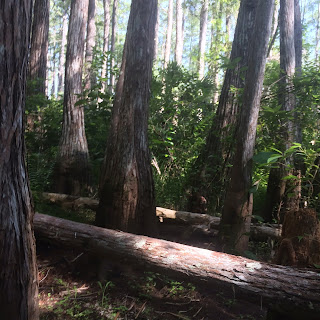Biophilia: the love, appreciation, and concern for all things in nature and that are alive
Biophobia: the feeling that nature exists solely to serve humans and no passion for it
 |
| FGCU Nature Trail Entrance. Photo by J Lane |
"Protecting animals in the wild while permitting confinement feeding operations and most laboratory use of animals makes no moral sense and diminishes our capacity for biophilia (Orr 208)."
Being the stereotypical vegan that I am I had to pick a quote regarding animals. However, I truly do agree with this statement made by Orr. Animals are a major part of nature. I will never understand how someone can say they love nature and yet give money to a zoo. If we truly love nature we should be allowing it to live as it was meant to be. It should be left alone in its natural habitat. By continuing to hold animals captive in zoos, slaughterhouses, and laboratories we are using animals and nature for our benefit instead of appreciating them. In my opinion you cannot be a biophiliac while contributing to the exploitation of animals.
 |
Elephants in a Zoo. Photo by Peta
http://www.peta.org/features/zoo-animal-abuse/ |
"But is it possible for us to be neutral or "objective" toward life and nature? I do not think so" (Orr 193).
Orr makes this statement that you cannot be neutral towards biophilia. However, his reasoning more so describes why humans must take a stand instead. While I agree with the fact that we have to own up and pick whether we want to reverse the damage of a biophobic world or not I disagree that a person cannot mentally be neutral to the matter. I think that there is a range between biophilia and biophobia. I do not know anyone who is 100 percent on either spectrum. For me, I love nature and animals and want to do what I can to protect them but I love being indoors and using modern technologies. Based on Orr's description I would be considered biophobic because I am not taking a definitive stand.
 |
| Fallen Trees on the FGCU Nature Trail. Photo by J Lane |
"We have tried utopia and can no longer afford it (Orr 211)."
I am confused about most of Orr's conclusion in
Love it or Lose It: The Coming Biophilia Revolution, but, in particular this last sentence. The main confusion probably comes from the fact that we must define utopia differently. This sentence seems to insinuate that we are currently is a state of utopia, or perfect world. How could the world we are living in be a utopia currently. If everything he has said thus far is true we are far from a utopia. We would be closer to a utopia in a biophilic world, at least in his opinion. To me, there is no one utopia, or one idea of perfection. Everyone would have their own idea of what an ideal society would be. So by saying that the utopia did not work does not make sense to me. Also, in the few sentences before he goes on to mention what a sane civilization would need. He mentions fewer lawyers and fewer wealthy people. These people should not necessarily be blamed for making society 'insane'. There are millionaires and billionaires that are giving a lot of their worth back to society and helping make the society more biophilic.



No comments:
Post a Comment